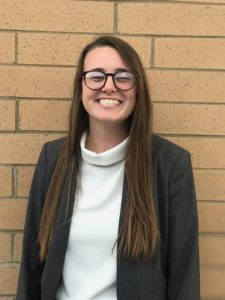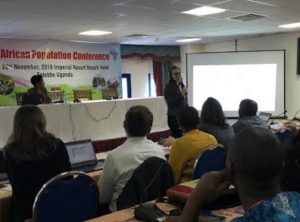Published on Dec. 8, 2020
Paige Smith, a senior public health major from St. Charles, Missouri, has always put others before herself. She started her Mizzou journey as a nursing major and was even pre-med for a short period. However, her undergraduate research experience inspired her to explore public health through the lens of mental health research — which has taken a different meaning during the COVID-19 pandemic.

Senior Paige Smith wants to pursue a career as a professor and mental health researcher following her extensive undergraduate research experience.
As a sophomore, Smith participated in the Discovery Fellows Program through which she was paired with Enid Schatz, professor and chair of MU’s Department of Public Health. Smith and Schatz studied the effects of HIV/AIDS in sub-Saharan Africa, collaborated on a paper and traveled together to Uganda in 2019 to present the work.
“I’m not a very well-traveled person, so that was a really cool experience,” Smith says. “It was cool to see all the different jobs attendees had and learn about the research they get to do. The people I got to meet were amazing.”
This summer, Smith applied for the Cherng Summer Scholars Program, hoping to continue with her Discovery Fellows research. But she had a last-minute change of heart after observing the effects of the pandemic on students her age.
“I saw how much COVID-19 was impacting student mental health, so I went in that direction instead,” Smith says.
Schatz was also Smith’s faculty mentor for the COVID research, but says Smith engineered most of the study herself.
“Through this study, Paige essentially learned how to be an academic researcher in two months,” Schatz says. “She’s open to feedback and very ‘mentorable,’ but also completely willing to put herself out there and do the work without needing to be spoon-fed each step of the way.”
Smith gathered data from about 200 participants during her summer study.
“I was surprised by how many students were experiencing mental health difficulties during this time,” Smith said. “Many without mental illness were experiencing symptoms of anxiety and depression which they may never have experienced before and therefore might not have had the coping mechanisms to deal with in a healthy way.”
Although the project was for the summer program, she is using her data in Assistant Professor of Health Sciences Claire Altman’s honors research methods course on a paper about how pre-existing mental health conditions affect mental health outcomes during the pandemic. She is also submitting her previous work to conferences.
Smith’s mental health research is only one of her many research projects. She also works with Carolyn Orbann, a medical anthropologist and health sciences associate teaching professor, comparing new and historical data. After Smith took some of Orbann’s previous classes, including her honors tutorial on the 1918 flu pandemic and its comparison to COVID-19, she got involved with the project as a research assistant.
Smith is helping collect and organize that data. Orbann says research helps connect history to current events in a meaningful way.

As part of her work researching HIV in sub-Saharan Africa, Smith presented with professor Enid Schatz in Uganda in 2019.
“Even though in my research you’re not interviewing living people, you’re still getting a picture of a world that can expand your horizons about what it’s like to be a person — what your experience is,” Orbann says.
As Smith prepares for graduation on Friday, Dec. 18, 2020, Orbann believes her experiences with research will help shape her future.
“She’s been strategic about building herself a well-rounded college experience,” Orbann says. “It’s a really good base for stepping into new experiences that she wants to have while putting herself through college.”
Smith’s undergraduate research has fueled her ambition to make a difference in the lives of others. Her ultimate career goal is to become a professor and to research mental health in marginalized communities.
“The COVID study helped her see that maybe she could make more of an impact by doing something besides being a doctor. It shifted her idea of what it means to give back,” Schatz says.
“I had always played with the idea, but doing my COVID-19 study this summer really solidified it,” Smith says. “I feel like meaningful changes can come from it.”